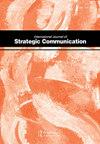情绪危机沟通:CEO内疚与愤怒表达对组织声誉的影响
IF 2.3
Q1 COMMUNICATION
International Journal of Strategic Communication
Pub Date : 2022-10-20
DOI:10.1080/1553118X.2022.2085574
引用次数: 0
摘要
摘要组织危机对组织及其利益相关者来说都是充满感情的事件。关于情绪对组织结果的影响,如声誉、宽恕和负面口碑,研究越来越多。目前的研究试图通过调查离散情绪在危机中的作用,以及这种情绪对组织声誉的影响,为情绪危机沟通中越来越多的研究做出贡献。此外,目前的研究试图调查情绪表达的效果是否取决于所采取的危机应对策略。设计了一个受试者之间的三(交流情绪;愤怒与内疚与无情绪)×二(反应策略:重建与否认)实验,共有922名参与者。研究结果表明,在严重危机的背景下,重建策略比否认策略能带来更积极的组织声誉,而且无论反应类型如何,内疚都优于愤怒。讨论了该研究对组织声誉和危机管理的启示。本文章由计算机程序翻译,如有差异,请以英文原文为准。
Emotional Crisis Communication: The Effects of CEO’s Expression of Guilt and Anger on Organizational Reputation
ABSTRACT Organizational crises are emotionally-charged occurrences for both organizations and their stakeholders. There has been a growing body of research on the effects of emotions on organizational outcomes such as reputation, forgiveness, and negative word-of-mouth. The current study seeks to contribute to this growing body of research in emotional crisis communication by investigating the role of discrete emotions in a crisis, and the effects of such emotions on organizational reputation. Additionally, the current study seeks to investigate whether the effect of emotional expression depends on the crisis response strategy adopted. A between-subjects three (communicated emotion; anger vs. guilt vs. no emotion) × two (response strategy: rebuilding vs. denial) experiment was designed with 922 participants. The findings show that, in the context of a severe crisis, rebuilding strategies result in a more positive organizational reputation than denial strategies and that guilt was superior to anger regardless of response type. The implications of the study on organizational reputation and crisis management are discussed.
求助全文
通过发布文献求助,成功后即可免费获取论文全文。
去求助
来源期刊

International Journal of Strategic Communication
Social Sciences-Sociology and Political Science
CiteScore
3.40
自引率
0.00%
发文量
39
期刊介绍:
The International Journal of Strategic Communication examines the philosophical, theoretical, and applied nature of strategic communication, which is “the purposeful use of communication by an organization to fulfill its mission.” IJSC provides a foundation for the study of strategic communication from diverse disciplines, including corporate and managerial communication, organizational communication, public relations, marketing communication, advertising, political and health communication, social marketing, international relations, public diplomacy, and other specialized communication areas. The IJSC is the singular forum for multidisciplinary inquiry of this nature.
 求助内容:
求助内容: 应助结果提醒方式:
应助结果提醒方式:


